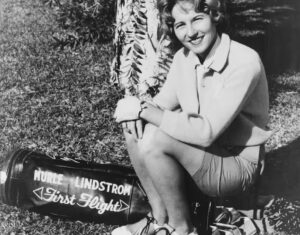The Experts’ Take – Vol. 2, Ep. 6: Social Media & the Pro Tours
Some of the game’s top pros are really good at the social media game; others, not so much. What should the professional tours’ top players be doing – and avoiding – as they engage the public through social media? Hear the thoughts of our all-star panel: Golf Channel/Sirius XM’s Michael Breed, renowned swing guru Hank Haney, Golfweek’s Geoff Shackelford, Golf Channel/PlayGolfMyrtleBeach.com’s Charlie Rymer, pro golfer/social media personality Paige Spiranac and Golf Tourism Solutions’ Bill Golden.
Charlie Rymer:
Back with our “Super Panel” here. That’s right: the “Super Panel,” folks! We’re in the Golf Capital of the World, Myrtle Beach, South Carolina. We’re going to talk a little social media. We’ve only got one of us here that’s a social media expert (Paige Spiranac). We’ll get her to her in a minute. Geoff Shackleford, who has an incredible blog. I read it every day, by the way, GeoffShackleford.com. Geoff, if you start looking around at tour players, you see some neat stuff with … Phil Mickelson now is on social media. Max Homa does a good job. Some of the ladies do a great job. Do we need more of that?
Geoff Shackelford:
Oh yeah. I don’t think we can ever get enough of the players sharing their life, allowing people to live, kind of, through them: what they eat, what they do in their spare time, apologize if they had something where they didn’t like the way they behave. I like all that. I don’t like when they use it as a way to break news instead of using the press, because they end up regretting that, which is a different hole to go down. But, I think it’s great. It makes them relatable. I wish more of them would share where they just go and play golf in their spare time, if they do that. I think it’s fantastic and some of them are really, really good at it. The ones who aren’t good usually figure out a way, somebody tells them, “You’ve got to get better at this.”
Charlie Rymer:
Michael, if you’re working with a young player who has potential to be a top 25 or top 50 player in the world, working with them on their career, trying to develop, do you tell them you need to worry about putting where you’re going to dinner at night on social media or do you get them to just focus on playing golf? Is it a distraction for a lot of young players?
Michael Breed:
It can be. I think it’s part of their life. I think they get used to, and Paige obviously can speak to this better than I, but they get used to sharing these different things. I think social media can be very good and very bad, and I don’t really see much in between. I think if you go out and hit that send or tweet or whatever it is that you hit that sends it out into the world, it needs to be thought of very seriously before you do that. I think, I’m sure, the PGA TOUR is involved with paying attention to training these players in that way. I would say, look, you know what, go out there, become a great player and figure out how to share all that other stuff later.
Geoff Shackelford:
But, hey. We’re having this slow play debate because a couple players went on social media and said, “I’ve had enough.” And they posted some things, and so sometimes they kind of influence things in a fun way.
Michael Breed:
Yeah. Yeah, but he’s talking about that young player that’s coming out, right?
Geoff Shackelford:
No, I know.
Michael Breed:
Yeah.
Geoff Shackelford:
And you would tell them “Don’t do that.” That’s good advice.
Michael Breed:
If you’ve got someone established out there, that’s a different game. If (Brooks) Koepka wants to go out there and say what he wants to say-
Geoff Shackelford:
Yeah.
Michael Breed:
He told (everyone) in the beginning of the year he was going to be more aggressive in that space.
Geoff Shackelford:
That he was.
Michael Breed:
I just think it can be very dangerous.
Charlie Rymer:
For young players coming out in the world of professional golf, I would think it would be hard to completely avoid social media. So, let’s say the PGA TOUR, the LPGA hired you to come in and talk or mentor a group of their professionals on how to deal with social media. What would be the first thing you would tell them that they’ve got to do, Paige?
Paige Spiranac:
Don’t force it. Always be your authentic self. I agree it’s either good or it’s really, really bad. Some people just can’t handle having social media, and that’s not a bad thing. I don’t think you need to force players to be vocal if they don’t feel comfortable with that. I think if they start to, people will kind of see through it and see that they’re not being their true selves. Phil (Mickelson) is killing it (on social media) because he’s just doing what he wants to do-
Charlie Rymer:
He’s funny.
Paige Spiranac:
And he loves it. If someone doesn’t react the same way, because there’s a lot of negativity on social media and their job is to be a professional golfer. That’s what they are trained to do. That’s what they want to do. That’s their job. That’s their passion. It’s not to do social media. If they want to share things through social media, that’s great. But, I don’t think they have to do it if they don’t want to do it. I think it’s actually more harmful for their playing careers to see all of the negativity and all of the comments and to get involved in kind of those debates. I think it’s great for, like, Brooks, because he loves to do it and I think that motivates him, but sometimes it doesn’t motivate players.
Charlie Rymer:
Hank, I love what she’s saying about the negativity.
Hank Haney:
(Laughing) I’m the wrong person to ask about-
Charlie Rymer:
Right. Right. No, no. But, if you’re playing this game that’s so hard, you’re playing the highest level, you don’t need all that negative crap coming in. It’s great to read the positive stuff, but I don’t want to be looking at negative stuff about me.
Hank Haney:
Yeah, but you’re talking about guys that are trying to establish themselves as PGA TOUR players. I mean, guys that have already established themselves, I mean Phil Mickelson is on the other end of the spectrum. He’s doing a great job that’s helping the game.
Charlie Rymer:
Bill, in the business world of golf, having players engaging with fans and social media, do you view that as a pretty big positive?
Bill Golden:
There’s no question, and we’re involved a little bit in that business of managing social media profiles and content for some folks on tour. And if they’re not, if it’s not their personality, let’s just say, to do that themselves, they really ought to have somebody do it for them, because that fan interaction is where the magic happens, right? That’s when somebody says, “Hey, my dad’s in the hospital, he’s a big fan of yours.” All of a sudden a hat shows up, right? You can interact with them on social media. There’s going to be trollers out there and they are everywhere. But, there are some really good one-to-one conversations and dialogues that these players or the player reps can have with fans, and that’s magic.
Paige Spiranac:
I always think it’s worse though, when you feel like you’re having a conversation with someone, (and) it’s not actually them. Or if a public figure will post something and you can tell that it is a “cut and copy.” I feel like that (if) you don’t have that connection or it’s almost like a fake connection. I would almost rather see a player, if they don’t want to do it, just not do it at all instead of kind of pretend to be doing it.
Bill Golden:
Yeah, I think it’s a great point, and that goes with the management process. If we were to reach out to a fan, it would not be on behalf of the player, but ultimately we would ask the player to do something for the fan or to the fan at some point. A lot of these folks, a lot of these men and women don’t want to mess around with social media. It’s not their favorite thing to do. Maybe they’re just a little more private. But, it does give fans access to what they do.
I think we should have, for example, more conversations with caddies. I’d love to see, what was your player talking about on the sixth hole, you know, when he hit that eight iron 200 yards?
Geoff Shackelford:
Oh boy, yeah.
Bill Golden:
You know, and have that from a caddy perspective. I just, I think those things, we, the fans, just don’t hear enough of that, right? We see it. I just feel like that interaction is important to help grow the game, the fan experience and overall engagement.
Charlie Rymer:
Certainly with social media, there are some positives, there are some negatives. My number one piece of advice? Never drink and tweet!
Geoff Shackelford:
Yeah.
Charlie Rymer:
Not good.



